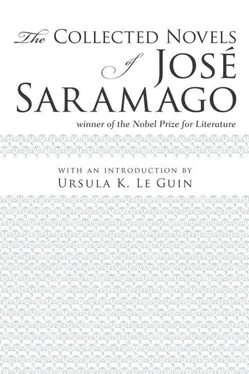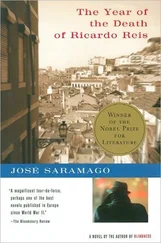Joseph finally puts the city behind him. There are no soldiers on the road for as far as the eye can reach, no crowds gathered as one might expect them to for a military parade, but the most reassuring sight of all is that of children playing innocent games, with none of the wild enthusiasm they display when flags, drums, and horns go marching by. If any soldiers had passed this way, there would be no boys in sight, they would have followed the detachment at least to the first bend in the road, as is the time-honored custom, and perhaps one child, his heart set on becoming a soldier someday, accompanied them on their mission and so learned the fate that awaited him, namely, to kill or be killed. Now Joseph can run as fast as he likes, he takes advantage of the slope, is hampered only by his tunic, which he hitches up over his knees. As in a dream, he has the agonizing sensation that his legs cannot keep up with the rest of his body, with his heart, head, and eyes, and his hands, eager to offer protection, are so painfully slow in their movement. Some people stop on the road and shake their heads disapprovingly at this undignified performance, for these people are known for their composure and noble bearing. The explanation for Joseph’s extraordinary behavior in their eyes is not that he is running to save his child’s life but that he is Galilean, one of a lot with no real breeding, as has often been observed. He has already passed Rachel’s tomb, and that good woman could never have suspected that she would have so much cause to weep for her children, to cover the nearby hills with her cries and lamentations, to claw at her face, tear out her hair, and then beat her bare skull.
Before he comes to the first houses on the outskirts of Bethlehem, Joseph leaves the main road and goes cross-country, I am taking a shortcut, he would reply if we were to question this sudden change of direction, a route that might be shorter but is certainly much less comfortable. Taking care not to encounter any laborers at work in the fields, and hiding behind boulders whenever he sees a shepherd, Joseph makes for the cave where his wife is not expecting him at this hour and his son, fast asleep, is not expecting him at all. Halfway up the slope of the last hill, from where he can already see the dark chasm of the grotto, Joseph is assailed by a terrible thought, suppose his wife has gone to the village, taking the child with her, nothing more natural, knowing what women are, than for her to take advantage of being on her own to make a farewell visit to Salome and several families with whom she has become acquainted in recent weeks, leaving Joseph to thank the owners of the cave with all due formality. He sees himself running through the streets and knocking on every door, Is my wife here. It would be foolish to inquire anxiously. Better, Is my son here, in case some woman, carrying a child in her arms, for example, should ask, on seeing him distressed, Is something wrong. No, nothing, he would reply, Nothing at all, it’s just that we have to set off at first light and we still haven’t packed. The village, seen from here, with its identical roof terraces, reminds Joseph of the building site, stones scattered everywhere until the workers assemble them, one on top of another, to erect a watchtower, an obelisk to commemorate some victory, or a wall for lamentations. A dog barks in the distance, others bark in response, but the warm evening silence continues to hover over the village like a blessing about to lose its effect, like a wisp of a cloud on the point of vanishing.
This pause was short-lived. In one last spurt the carpenter reached the entrance to the cave and called out, Mary, are you there. She called in reply, and Joseph realized that his legs were weak, probably from all the running, but also from the sheer relief of knowing his child was safe. Inside the cave Mary was chopping vegetables for the evening meal, the child asleep in the manger. Joseph collapsed on the ground but was soon back on his feet, We must leave, we must get out of this place. Mary looked at him in dismay, Are we leaving, she asked, Yes, this very minute, But you said, Be quiet and start packing while I harness the donkey. Aren’t we going to eat first. No, we’ll eat something on the way. But it will soon be dark and we might get lost, whereupon Joseph lost his temper, Be quiet, woman, I’ve already told you we’re leaving, so do as I say. Tears sprang to Mary’s eyes, this was the first time her husband had ever raised his voice to her. Without another word she began gathering their scant possessions. Be quick, be quick, he kept repeating as he saddled the donkey and tightened the straps and crammed whatever came to hand into the baskets, while Mary looked on dumbfounded at this husband she barely recognized. They were ready to leave, the only thing left to be done now was put out the fire with earth. Joseph signaled to his wife to wait until he took a look outside.
The ashen shadows of twilight merged heaven and earth. The sun had not yet set, but the heavy mist, while too high to obscure the surrounding fields, kept the sunlight from them. Joseph listened carefully, took a few steps, his hair on end. A scream came from the village, so shrill that it scarcely sounded human, its echo resounding from hill to hill, and it was followed by more screams and wailing, which could be heard everywhere. These were not weeping angels lamenting human misfortune, these were the voices of men and women maddened by grief beneath an empty sky. Slowly, afraid of being heard, Joseph stepped back to the cave, and collided with Mary, who had disregarded his warning. She was trembling. What are those screams, she asked, but he pushed her back inside without replying and hastily began throwing earth on the fire. What are those screams, Mary asked a second time, invisible in the darkness, and Joseph eventually answered, People are being put to death. He paused and then added in a whisper, Children, by order of Herod, his voice breaking into a dry sob, That’s why I said we should leave. There was a muffled sound of clothing and hay being disturbed, Mary was lifting her child from the manger and pressing him to her bosom, Sweet little Jesus, who would want to harm you, her words drowned in tears. Be quiet, said Joseph, don’t make a sound, perhaps the soldiers won’t find this place, they’ve been ordered to kill all the children in Bethlehem under the age of three. How did you find out. I overheard it in the Temple and that’s why I ran back. What do we do now. We’re on the outskirts of the village, the soldiers aren’t likely to look inside these caves, they’ve been ordered to carry out a house-to-house search, so let’s hope no one reports us and we’re spared. He took another cautious look outside, the screaming had stopped, nothing could be heard now except a wailing chorus, which gradually subsided. The massacre of the innocents had ended.
The sky was still overcast. The advancing darkness and the mist overhead had erased Bethlehem from the sight of those inhabiting heaven. Joseph warned Mary, Don’t move from here, I’m going out to the road to see if the soldiers have gone. Be careful, said Mary, forgetting that her husband was in no danger, only children under the age of three, unless someone else had gone out to the road with the intention of betraying him, telling the soldiers, This is Joseph, the carpenter, whose child is not yet three, a boy called Jesus, who could be the child mentioned in the prophecy, for our children cannot be destined for glory now that they are dead.
Inside the cave one could touch the darkness. Mary, who had always feared the dark, was used to having a light in the house, from either the fire or an oil lamp, or both, and the feeling, all the stronger now that she was hiding here in the earth, that fingers of darkness would reach out and touch her lips, filled her with terror. She did not want to disobey her husband or expose her child to danger by leaving the cave, but she was becoming more terrified by the minute. Soon the fear would overpower her fragile defenses of common sense, it was no good telling herself, If there was nothing in the cave before we put out the fire then why should there be anything now, although this thought gave her just enough courage to grope her way to the manger, where she settled her child, and then, carefully creeping around until she found the spot where the fire had been, she poked the ashes with a piece of firewood until a few embers appeared that had not yet completely died. Her fear vanished at once as, remembering the luminous earth, she watched this tremulous glow with crisscrossing flashes like a torch that darts over the ridge of a mountain. The image of the beggar came to her, only to be pushed aside by the urgent need to create more light in that terrifying cave. Fumbling, Mary went to the manger to fetch a handful of straw. Guided by the faint glow on the ground, she was back in an instant and soon had the oil lamp set up in a corner, where it could cast a pale but reassuring light on the nearby walls without attracting the attention of anyone outside. Mary went to her child, who continued to sleep, indifferent to fears, cares, and violent deaths. Taking him in her arms, she went and sat near the lamp and waited.
Читать дальше












